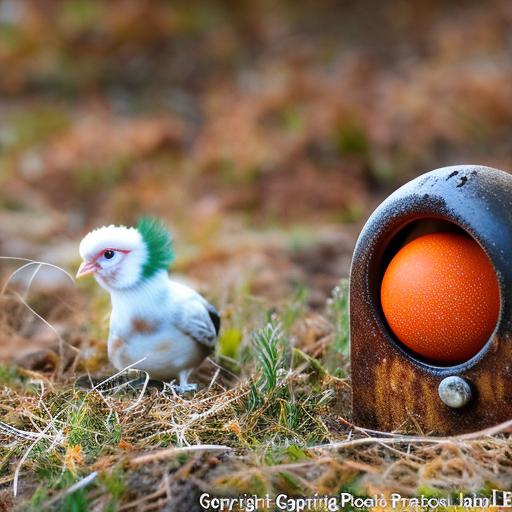Winter egg-laying can be a challenge for chicken owners, but it’s not impossible! Many people assume that chickens stop laying eggs in the winter, but with a little preparation and care, you can continue to enjoy fresh eggs all winter long. In this article, we will discuss the steps you can take to ensure that your chickens continue to lay eggs during the colder months.
Key Takeaways
- Chickens can lay eggs in the winter with proper care and preparation.
- Understanding the winter egg-laying cycle is important for maximizing egg production.
- Preparing the chicken coop for winter involves insulation, ventilation, and bedding.
- Adequate lighting is necessary for egg-laying, with 14-16 hours of light per day recommended.
- Maintaining optimal temperature and humidity levels, adjusting the chicken’s diet, and ensuring hydration are all crucial for winter egg-laying success.
Understanding the Winter Egg-Laying Cycle
Chickens naturally lay fewer eggs in the winter due to shorter daylight hours and colder temperatures. As the days get shorter, chickens’ reproductive systems slow down, resulting in a decrease in egg production. However, some breeds are better suited for winter egg-laying than others. Breeds such as Rhode Island Reds, Sussex, and Plymouth Rocks are known for their ability to lay eggs consistently throughout the year.
It’s important to understand the natural cycle of egg-laying in order to properly care for your chickens in the winter. By knowing when to expect a decrease in egg production and when it is likely to pick back up again, you can adjust your management practices accordingly.
Preparing the Chicken Coop for Winter
One of the most important steps in ensuring that your chickens continue to lay eggs in the winter is preparing their coop. Insulating the coop and sealing any drafts is crucial for keeping chickens warm in the winter. Cold drafts can cause stress and discomfort for chickens, which can lead to a decrease in egg production.
Adding extra bedding and providing a cozy nesting area can also help keep chickens comfortable. Straw or wood shavings make excellent bedding materials and provide insulation against the cold ground. Make sure to regularly clean out soiled bedding to maintain a clean and healthy environment for your chickens.
Providing Adequate Lighting in the Chicken Coop
Since chickens need a certain amount of daylight to lay eggs, adding artificial lighting to the coop can help encourage egg-laying in the winter. By extending the amount of daylight hours, you can trick your chickens’ reproductive systems into thinking it is still summer.
It’s important to use the right type of lighting and to not overdo it, as this can be harmful to the chickens. Use a low-wattage bulb or LED light to provide additional light in the coop. Aim for a total of 14-16 hours of light per day, including natural and artificial light. Be sure to turn the lights on and off at consistent times each day to mimic a natural day-night cycle.
Maintaining Optimal Temperature and Humidity Levels
Keeping the coop at the right temperature and humidity levels is important for the health and comfort of the chickens. Extreme cold or heat can cause stress and decrease egg production. A thermometer and hygrometer can help you monitor these levels and make adjustments as needed.
During the winter, aim to keep the coop temperature between 40-60 degrees Fahrenheit (4-15 degrees Celsius). If temperatures drop below freezing, consider using a heat lamp or other heating source to keep the coop warm. However, be cautious when using heat lamps, as they can be a fire hazard if not used properly.
Maintaining proper humidity levels is also important. Aim for a humidity level of around 50-70%. Too much humidity can lead to respiratory issues, while too little can cause dryness and discomfort for the chickens. Provide proper ventilation in the coop to help regulate humidity levels.
Adjusting the Chicken’s Diet for Winter

In the winter, chickens need more calories to maintain their body temperature. Feeding them a diet that is higher in protein and fat can help keep them healthy and warm. Increase their feed intake by offering them more food throughout the day.
Consider adding supplemental treats such as black oil sunflower seeds or mealworms to their diet. These treats are high in fat and protein, which can help provide the extra calories they need during the winter months. However, be mindful not to overfeed them, as this can lead to obesity and other health issues.
Ensuring Adequate Hydration for Chickens in Winter
Chickens need access to clean water at all times, even in the winter. Dehydration can lead to a decrease in egg production and other health issues. However, water can freeze in cold temperatures, making it difficult for chickens to drink.
Using a heated waterer or regularly changing out frozen water can help ensure that chickens stay hydrated. Heated waterers are designed to keep the water from freezing, allowing chickens to have access to fresh water at all times. If using a regular waterer, make sure to check it frequently and replace any frozen water with fresh water.
Managing the Health of Chickens in Winter
Winter can be a challenging time for chickens, as they are more susceptible to illness and injury. Cold temperatures and wet conditions can weaken their immune systems, making them more prone to respiratory infections and other diseases.
Regularly checking for signs of illness and providing proper care can help keep chickens healthy and happy. Inspect your chickens regularly for any signs of illness such as coughing, sneezing, or lethargy. If you notice any abnormalities, consult a veterinarian for proper diagnosis and treatment.
Encouraging Egg-Laying through Nesting Boxes and Roosting Bars
Providing comfortable nesting boxes and roosting bars can help encourage chickens to lay eggs in the winter. Make sure the nesting boxes are clean and well-maintained. Add fresh bedding regularly to keep the nesting area cozy and inviting.
Roosting bars should be wide enough for chickens to comfortably perch on. This helps keep their feet warm by minimizing contact with the cold ground. Make sure to clean the roosting bars regularly to prevent the buildup of droppings, which can lead to health issues.
Enjoying Fresh Eggs All Winter Long!
With a little extra care and attention, you can continue to enjoy fresh eggs from your chickens all winter long. By understanding the natural cycle of egg-laying, properly preparing the coop, and providing adequate nutrition and care, you can help your chickens thrive in the winter months.
Remember to insulate the coop, provide adequate lighting, maintain optimal temperature and humidity levels, adjust the chicken’s diet, ensure adequate hydration, manage their health, and provide comfortable nesting areas and roosting bars. By following these steps, you can ensure that your chickens stay healthy and continue to lay eggs throughout the winter season.
If you’re interested in learning more about how to keep chickens laying eggs in winter, you might find this article on the Poultry Wizard website helpful. It provides valuable tips and insights on creating a garden chicken coop that is specifically designed to keep your chickens productive during the colder months. Check out the article here to discover practical strategies for maintaining egg production all year round. And while you’re on the Poultry Wizard website, don’t forget to explore their other informative articles, such as this one on whether quails sit on their eggs here.
FAQs
What is the best way to keep chickens laying eggs in winter?
The best way to keep chickens laying eggs in winter is to provide them with a warm and dry shelter, adequate lighting, and a balanced diet.
What kind of shelter do chickens need in winter?
Chickens need a shelter that is well-insulated, draft-free, and dry. The coop should be large enough to accommodate all the chickens comfortably and should have good ventilation to prevent moisture buildup.
How much light do chickens need to lay eggs in winter?
Chickens need at least 14 hours of light per day to lay eggs consistently. If natural light is not sufficient, artificial lighting can be used to supplement it.
What kind of diet do chickens need in winter?
Chickens need a balanced diet that includes a good quality layer feed, fresh water, and occasional treats such as fruits and vegetables. It is also important to provide them with grit to aid in digestion.
What are some common mistakes people make when trying to keep chickens laying eggs in winter?
Some common mistakes people make include not providing enough light, not keeping the coop warm and dry, and not providing a balanced diet. It is also important to avoid overcrowding the coop, as this can lead to stress and a decrease in egg production.
Meet Walter, the feathered-friend fanatic of Florida! Nestled in the sunshine state, Walter struts through life with his feathered companions, clucking his way to happiness. With a coop that’s fancier than a five-star hotel, he’s the Don Juan of the chicken world. When he’s not teaching his hens to do the cha-cha, you’ll find him in a heated debate with his prized rooster, Sir Clucks-a-Lot. Walter’s poultry passion is no yolk; he’s the sunny-side-up guy you never knew you needed in your flock of friends!







